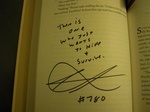Lance Alvein
To get us started, Brandon, do you want to give everyone a quick idea of what the cosmere is?
Brandon Sanderson
*laughs* Okay. So, here's what's going on: When I first was trying to break in—this was over ten years ago now, like fifteen—someone told me that your first five books were generally unpublishable. That was fairly good advice; I found that for most people it's really just your first novel; your second novel tends to get really good. For me, I did end up writing five experimental books that I never published; Elantris was my sixth book. Another piece of advice I got while I was working on it, however, was: you don't want to start with a big epic, the reason for that being is that you want to give a chance for readers to read something, you know, a single volume, or maybe one or two books before—so they can see, so they can trust you to finish a story before you jump into a big epic. It actually seemed like pretty good advice to me; it also works very well with publishing because approaching editors and things like that, you want to be able to send them a book, and if they reject it, but say, "Hey, I'd like to see something else by you; this wasn't the right project for me, but I like your writing." You can't really send them book two of that series, right? Because, you know, they want to see something new, and so I sat down to write a sequence of three or four standalone epic fantasy novels that potentially could have sequels maybe, but the idea was to make them standalone. But, kind of in my heart, I've always loved the big epic. You don't grow up reading Robert Jordan and Tad Williams and Melanie Rawn and people like this, without saying, "I want to do that." And so, what I started doing was actually building a hidden epic behind the scenes with all of these books, the idea being that there were characters who were crossing between the worlds that would have a story that someday I would tell that wouldn't be directly important to the book itself, but would lay the groundwork and give foreshadowing to something very large coming.
And so I designed this thing—you know, I'm a worldbuilder—I designed this thing with a sequence of planets and a story behind the story, and people crossing between them. And so, when I wrote Elantris, I embedded all of this in there, and then my next books were in that sequence jumping around—some were before, some were after—and things like this, so there are these continuing characters. Well, years and years later, I decided I would finally start writing something big and epic; I was tired of not getting published; I was tired of all the advice people were giving me; I had written a couple of books that were not very good based on the advice that people had given me. I said, "I just want to write my big epic," and that's when I started Way of Kings, and wrote that. And I'm like "I'll the launch into the big epic, some of these things are going to be more important to the series" It was kind of me honestly giving figuratively the bird to all of publishing, saying, you know, "You've told me that my books are too long, that two hundred thousand words is too long; I'm gonna write one that's four hundred thousand," so, you know: "I don't care; it's gonna be big and awesome and it's the book for me." I spent eighteen months working on this book, and right after I finished it, I sold Elantris. It sat on an editor's desk for a year and a half. He finally picked it up and read it, and tried to get a hold of me the next day wanting to buy it.
And so, suddenly I sell Elantris which I had written like five years before, which had all these things embedded in it, and I sent that editor The Way of Kings, because you know he wanted to buy two books from me. He's like, "Alright, the standalone is great; what else do you have?" so I sent him Way of Kings, and he panicked. *laughter* He was like, "Ahhhhh, this is huge, and what are all these illustrations that you're talking about, and I don't know if we can-- can we break this into like four books?" And I'm like, "No no, it's gotta be one book." And he's like, "Ahhh...." But fortunately for him, I didn't feel the book was ready at that point, otherwise I might have forced him to publish it. I felt my skill wasn't up to the task of doing that since I'd practiced only doing standalones up to that point, and so I said, "I want to do a trilogy so I can practice the series format; I've got a pitch on this book called Mistborn that I want to write for you." And Mistborn was the first book that I ever wrote knowing it would get published. So when I sat down to write Mistborn, I had already sold Elantris, and Elantris was coming out, and it all of this stuff embedded in it, and I'm like, "Do I keep going with that or not? Do I just go all in?" And so I decided to go ahead and do it, and so Mistborn has all of this behind-the-scenes sort of story things built into it, and there's a character from Elantris—it's the beggar that Sarene meets near the end—who is also in Mistborn, who is the beggar that Kelsier talks to, that they wanted-- pretending to be blind, that he gets information from, and then this character keeps appearing in all of the books as kind of a little Easter egg that was not so Easter-eggery because the fans found it right away. *laughter*
And so the cosmere is my name for this big universe, which is actually, you know, just a play on "cosmos"—it's not the most original word—but it's something I had actually come up with when I was a teenager, so, it's one of those relics that's in there that if I were to do it now, I might name it something a little less obvious. I don't know; it does work, and it is a fun name, so that's there. The character's name is Hoid, and there are other characters moving between the planets, and so there is a buried, deeper story to all of my big fantasies. The thing that I want to tell people, though, is that you don't need to read them in order because these are just Easter eggs; there's not a story there that you can really piece together yet. I don't want people to feel they have to read Elantris before Mistborn, or they can't, you know-- If you read them all, at some point you will have some little extra tidbits of information, but there's not something there that's going on that's chronological that you need to know about right now, but that's in a nutshell what's going on there; there is an underlying theory of magic for all of the epic fantasies that they all follow. I love the concept in science of the unifying law, right? If you guys have studied physics, there's this belief that somewhere out there there's a unifying theory that will unite all of physics, and because right now, you know, the things that happen on the macro scale don't really match what happen on the quantum scale, and you kind of have to have two sets of equations, and people believe that someday we'll find that link that'll put them all together, and that's fascinating to me, science is, and so I have a unifying theory of magic for all of my worlds that people in-world on various planets are figuring out with regards to theirs, but if they had all of the pieces they could kind of put it all together.


